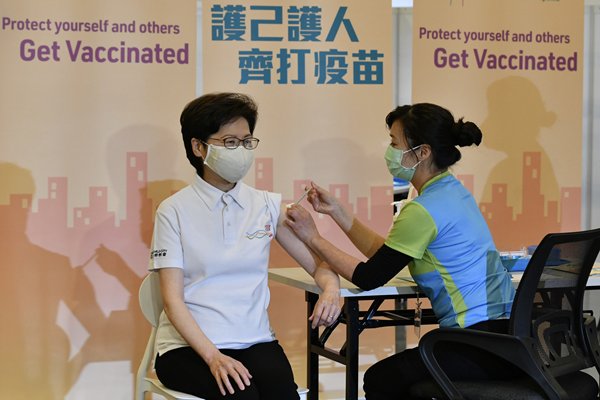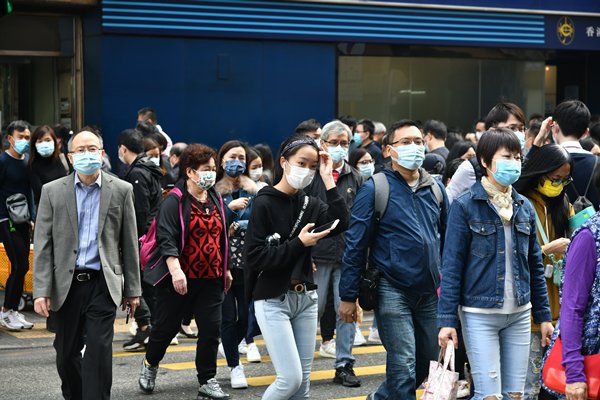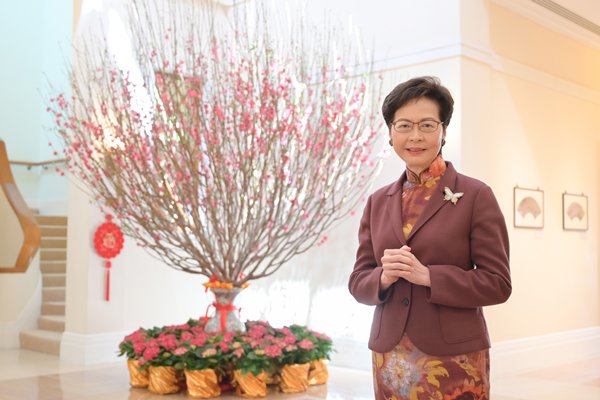
Hong Kong has entered the second year of the fight against COVID-19. In the past month, we were delighted to see two positive developments. First, after more than three months of arduous efforts, the latest wave of epidemic that began in late November last year has apparently eased. This has enabled us to relax the social distancing measures to a limited extent after the Lunar New Year holiday. Schools are allowed to resume face-to-face classes gradually, and economic activities and people’s daily lives are returning to normal steadily. Second, the government vaccination programme has started right after the arrival of the first batch of COVID-19 vaccines which has been approved for emergency use in Hong Kong in accordance with the law. We will continue to work tirelessly to strengthen testing and trace the close contacts of confirmed cases with a view to cutting the virus transmission chains and achieving the goal of zero infections, and to get Hong Kong out of the epidemic through widespread vaccination.
How the epidemic has developed
The latest wave of epidemic that began in late November, after reaching its two peaks in mid-December and mid-January, has subsided since late January. Recently, the number of daily new cases has already come down to single digits or low double digits. Like many citizens, we are relieved that the epidemic situation has eased.
However, it must be noted that single-digit local cases with unknown sources are still reported every day, indicating that there are still undetected infections in the community. Social gatherings during the Lunar New Year and the relaxation of social distancing measures since the seventh day of the Lunar New Year have also brought certain risks, such as the emergence of infections in a restaurant involving at least 30 confirmed cases recently. Therefore, we must stress that now is not the time to drop our guard. The Government has to remain vigilant, whether in preventing the importation of cases or curbing the spread of the virus in the community. Yet, compared to a year ago, our anti-epidemic capability, whether in virus testing, quarantine and treatment facilities, manpower for case tracing, technology application, etc, has been significantly enhanced.
Anti-epidemic efforts
The epidemic has been gradually brought under control since late January. This can be partly attributed to the Government’s continuous efforts in stepping up testing. At present, as long as one or more new confirmed cases are found in a residential building (including buildings for both commercial and residential uses) in any district in Hong Kong, or there are sewage samples tested positive which implies possible infection risks, the building will be included in the compulsory testing notice. Since February 1, more than 200 buildings or premises have been included in the compulsory testing notice. Apart from this, intensive restriction-testing declaration operations were conducted between January 23 and February 10, where people within a specified restricted area were required to stay in their premises and undergo compulsory testing within a specified time frame by a declaration made under the law. During the above period, the Government mobilised civil servants, including those from disciplinary forces and clerical staff members, from over 40 government bureaus and departments. A total of 26 operations were conducted, during which some 25,000 people were tested and 20 confirmed cases were identified. Throughout the process, the relevant departments kept improving the flow of operation by consolidating the experience gained, making it possible for the operation to start in the evening and end in the morning, thereby minimising the impact on residents within the restricted area.
As social distancing measures have been suitably relaxed after the Lunar New Year, the Government requires staff of catering businesses and specific premises to undergo regular testing to protect themselves and their customers. Some sectors also voluntarily require their workers to take the tests. For example, the Construction Industry Council and the Hong Kong Construction Association require all site staff to present proof of a negative virus test result when entering the construction sites for work. With the Government’s measures and the support and co-operation of various sectors, the average number of tests conducted in Hong Kong per day exceeds 70,000 in February, 70% more than that of January.
In addition, to facilitate tracing of close contacts of confirmed cases, the Government requires people entering government premises or specified premises to use the LeaveHomeSafe mobile app. The app does not require user registration, nor does it have any tracking functions. It will not keep user data in any government or other systems and poses no privacy risk to users. We would like to thank members of the public for their support and co-operation. So far, the app has been downloaded three million times and, as a matter of fact, no privacy issue has arisen.
As for violations of anti-epidemic requirements, various government departments have taken strict enforcement actions against offenders. One of the scheduled premises has been ordered to suspend business for 14 days for violating the requirements on measuring body temperature and displaying the LeaveHomeSafe QR code, and the people concerned have been prosecuted. Moreover, more than a hundred people have been fined a fixed penalty of $5,000 for violating the compulsory testing requirement. It is not difficult, and is our civic duty, to comply with the anti-epidemic measures. I urge members of the public not to defy the law.
The major measures introduced are set out below chronologically:
Date
Event
February 1
The Government comprehensively stepped up measures on testing and tracing of close contacts, including covering a building in the compulsory testing notice if one or more new confirmed cases with unknown sources are found in the building, or there are sewage samples tested positive; conducting more restriction-testing declaration operations; lowering the threshold for compulsory testing for workplaces; and adopting two-tier tracing (ie apart from tracing the close contacts of confirmed cases and putting them under quarantine, the household members of close contacts will also be traced).
February 3
The Government announced that all kindergartens, primary and secondary schools as well as tutorial schools could arrange more students to return to campuses after their Lunar New Year holidays, with the number of students capped at one-third of the total number of students of the schools. If schools can arrange all teachers and staff to undergo regular virus testing once every two weeks, they will have the condition to fully resume half-day face-to-face classes.
February 4
The Government launched a pilot scheme, under which government employees and members of the public are required to use the LeaveHomeSafe mobile app when entering some government buildings or offices, including the Central Government Offices. The requirement will be extended to all government buildings and offices from March 1.
February 6
The Government further tightened the threshold for compulsory testing. In all districts in Hong Kong, if one or more new confirmed cases are found in a residential building (including buildings for both commercial and residential uses), or there are sewage samples tested positive, the building will be included in the compulsory testing notice.
February 18
Government departments fully resumed normal public services. Social distancing measures were also relaxed subject to conditions, including allowing certain premises to resume operation to a limited extent and extending the dine-in service hours of catering businesses to 10pm with a maximum of four people per table. Meanwhile, all staff of such premises or businesses have to undergo virus testing on a regular basis and patrons have to use the LeaveHomeSafe app.
February 18
Following the authorisation of the vaccine developed by Fosun Pharma and BioNTech (ie Comirnaty vaccine) on January 25, the Secretary for Food & Health, with reference to the advice of the experts, authorised the vaccine developed by Sinovac (ie CoronaVac vaccine) for emergency use in Hong Kong.
February 18
The Government announced the details of the vaccination programme. Five priority groups can make a booking online from February 23 onwards and receive vaccination from February 26 onwards.
February 19
The first batch of one million doses of CoronaVac vaccine was delivered to Hong Kong from Beijing.
February 20
The Government further tightened the testing and quarantine arrangements for air crew members, sea crew members, etc. Basically, all people who have stayed in any places outside China during the 21 days prior to arrival in Hong Kong are required to undergo testing and quarantine at designated places before entering the local community.
February 22
The Chief Executive, together with a number of secretaries of departments, directors of bureaus and members of the Executive Council and the Legislative Council, took the lead to receive COVID-19 vaccination.
February 24
The number of people allowed in group gatherings in public places was relaxed from two to four.
February 26
People in the five priority groups who have made a booking can start to receive vaccination at five community vaccination centres and 18 general out-patient clinics under the Hospital Authority.
Vaccination Programme
The Government has been taking forward proactively the work on the procurement, approval and preparation for the administration of vaccines over the past months. We were therefore able to kick-start the government vaccination programme immediately after the arrival of the first batch of one million doses of the Sinovac vaccine, developed and produced by the Mainland, in Hong Kong from Beijing on February 19. I took the lead to receive the first dose of the COVID-19 vaccine in Hong Kong on February 22 and was followed by a number of secretaries of departments and directors of bureaus, members of the Executive Council and the Legislative Council. About 200 people of the priority groups, including healthcare workers, staff of residential care homes for the elderly, airport personnel and cross-boundary goods vehicle drivers as well as members of the disciplined services were also vaccinated. As far as I know, people who have received the jabs have been feeling well so far, and I don’t even feel any pain in my arm. I hope members of the public would feel at ease about getting vaccinated.
Indeed, no matter whether it is the Sinovac vaccine which is developed and produced in the Mainland or the Comirnaty vaccine manufactured by BioNTech from Germany, they have been assessed by experts and authorised by the Secretary for Food & Health for emergency use in Hong Kong in accordance with the relevant legislation. Members of the public should view the vaccines in a scientific manner and not fall prey to various lies about vaccines. The Government has established a mechanism to monitor clinical events after vaccination of members of the public and has set up an indemnity fund in case there are severe adverse events.
The vaccination programme commenced smoothly in Hong Kong. I have to express my gratitude to scientists and pharmaceutical companies in different places for their hard work in research and development as well as production of vaccines in the past year; to the Central People’s Government for facilitating the smooth and speedy arrival of the Sinovac vaccine in Hong Kong; to the local experts for their participation in the approval of vaccines and assessment of possible clinical events after vaccination; to our partners including the Hospital Authority, healthcare organisations, private clinics as well as transport companies, airlines, logistics companies and more which help with our vaccine delivery; and also to all colleagues who have participated in the preparation and implementation of the programme. What we need now is the active participation of members of the public. I am pleased to note that more than 70,000 people made reservations on the first day of the launch of online booking, and the quotas of vaccination for the first two weeks were fully taken within some 10 hours. The Government will provide more quotas as soon as possible. I believe that when the private clinics start to administer the Sinovac vaccine next week, it will be even more convenient for the members of the public.
Vaccination not only protects yourself, it protects your families and friends as well as the community. It will also help Hong Kong get through the epidemic. I sincerely appeal to every member of the public – protect yourself and others, get vaccinated!
Chief Executive Carrie Lam issued this article titled Fighting the Epidemic for 13 months Get Vaccinated to Protect Yourself & Others on February 27.






